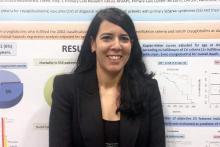San Francisco – Patients with primary Sjögren’s syndrome who met criteria for cryoglobulinemic vasculitis were significantly more likely to develop B-cell lymphoma and to die during follow-up, compared with patients who did not have cryoglobulins, in a large multicenter study.
The study’s findings reveal one subset of Sjögren’s patients who need more frequent and intensive follow-up, said Dr. Soledad Retamozo, who led the study while she was at the rheumatology unit at Hospital Privado Centro Médico de Córdoba in Córdoba, Argentina. She is now with the department of autoimmune diseases at CELLEX Biomedical Research Center, part of the University of Barcelona’s Institut d’Investigacions Biomèdiques August Pi i Sunyer.
Patients with primary Sjögren’s syndrome can have cryoglobulins and several other kinds of autoantibodies, including anti-SSA/Ro, anti-SSB/La, rheumatoid factor, and antinuclear antibodies (Clin Epidemiol. 2014;6:247-55). That diversity helps explain why patients have such varying clinical presentations and long-term outcomes, as researchers have noted. Cryoglobulinemic vasculitis is known to precede lymphoma in primary Sjögren’s syndrome, but few studies have examined the association or effects on mortality.
To explore those questions, Dr. Retamozo and her colleagues at rheumatology centers in Spain and Italy performed cryocrit testing in 515 consecutive patients with primary Sjögren’s syndrome. A total of 94% of patients were female, and they averaged 54 years of age at diagnosis. In all, 65 (12%) of the patients tested positive for cryoglobulins, resembling the prevalence in a prior report (Semin Arthritis Rheum. 1998 Dec;28[3]:200-5).
About one in every three patients with cryoglobulinemia also fulfilled the classification criteria for cryoglobulinemic vasculitis that were published in 2011 (Ann Rheum Dis. 2011;70:1183-90) and validated last year (Rheumatology [Oxford]. 2014;53[12]:2209-13). Patients who met the vasculitis criteria were “sicker” than other cryoglobulinemic patients by many measures, according to Dr. Retamozo. They had about twice the rate of type II cryoglobulinemia (86% vs. 43%), a fivefold higher average cryocrit level (6.6% vs. 1.25%), a more than twofold higher cumulative mean ESSDAI (EULAR Sjögren’s Syndrome Disease Activity Index) score (35.3 vs. 16.2), and significantly higher rates of hypocomplementemia, monoclonality, lymphadenopathy, peripheral neuropathy, and renal, skin, and joint disease.
Over an average follow-up period of 9.1 years, 9% of the entire cohort developed B-cell lymphoma, and 6% of the cohort died, Dr. Retamozo and her associates found. Cryoglobulinemic patients with primary Sjögren’s syndrome were more likely than test-negative patients to develop B-cell lymphoma (hazard ratio, 2.56; 95% confidence interval, 1.03-6.35), and the association was even stronger for patients with cryoglobulinemic vasculitis (HR, 7.47; 95% CI, 3.38-16.53). Patients with vasculitis also were significantly more likely to die during follow-up in a Kaplan-Meier survival analysis (HR, 4.36; 95% CI, 1.32-14.47), Dr. Retamozo reported.
The findings reflect a recent systemic review and meta-analysis by researchers from the Mayo Clinic (Rheumatology [Oxford]. 2015 Sep 27. doi: 10.1093/rheumatology/kev354) that separately linked vasculitis and cryoglobulinemia to mortality in primary Sjögren’s syndrome. “We measure cryocrit every 3-6 months in our Sjögren’s patients, and it helps us catch patients at greater risk of developing B-cell lymphoma,” Dr. Retamozo said. “For us it has been very helpful, in addition to tests for hypocomplementemia and monoclonality.”
The findings have been accepted for publication in the journal Rheumatology, she added.
Dr. Retamozo had no disclosures. One coauthor reported receiving research funding from Bristol-Myers Squibb.


